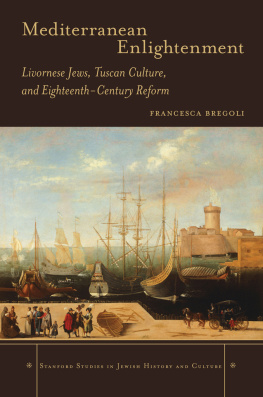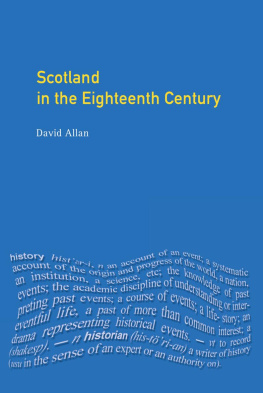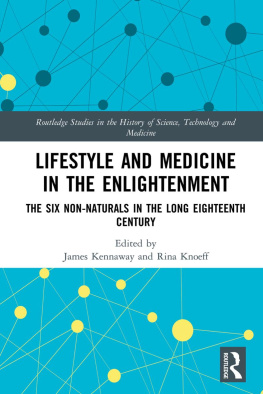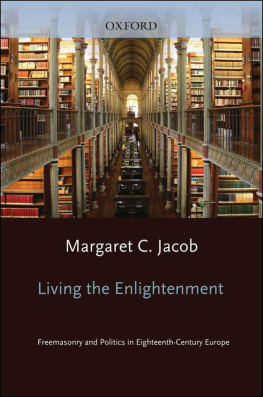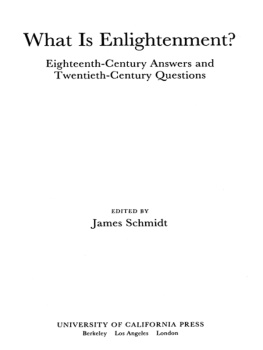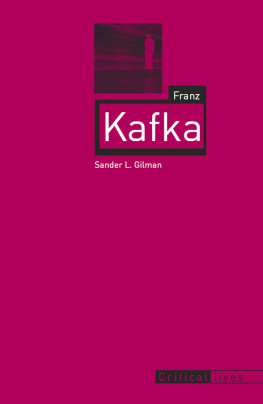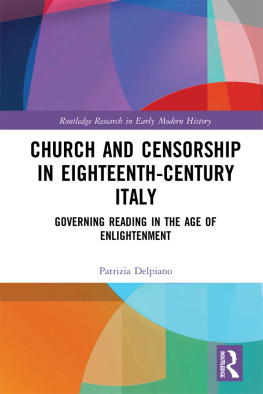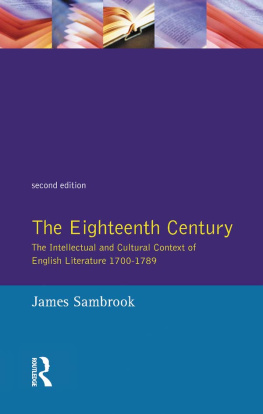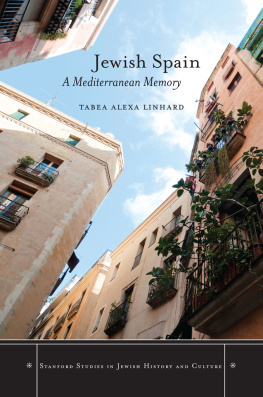Bregoli - Mediterranean Enlightenment : Livornese Jews, Tuscan culture, and eighteenth-century reform
Here you can read online Bregoli - Mediterranean Enlightenment : Livornese Jews, Tuscan culture, and eighteenth-century reform full text of the book (entire story) in english for free. Download pdf and epub, get meaning, cover and reviews about this ebook. City: Livorno., Livorno (Italy), Toskana., Tuscany (Italy), Italy--Tuscany., Italy--Livorno, year: 2014, publisher: Stanford University Press, genre: Home and family. Description of the work, (preface) as well as reviews are available. Best literature library LitArk.com created for fans of good reading and offers a wide selection of genres:
Romance novel
Science fiction
Adventure
Detective
Science
History
Home and family
Prose
Art
Politics
Computer
Non-fiction
Religion
Business
Children
Humor
Choose a favorite category and find really read worthwhile books. Enjoy immersion in the world of imagination, feel the emotions of the characters or learn something new for yourself, make an fascinating discovery.
- Book:Mediterranean Enlightenment : Livornese Jews, Tuscan culture, and eighteenth-century reform
- Author:
- Publisher:Stanford University Press
- Genre:
- Year:2014
- City:Livorno., Livorno (Italy), Toskana., Tuscany (Italy), Italy--Tuscany., Italy--Livorno
- Rating:4 / 5
- Favourites:Add to favourites
- Your mark:
- 80
- 1
- 2
- 3
- 4
- 5
Mediterranean Enlightenment : Livornese Jews, Tuscan culture, and eighteenth-century reform: summary, description and annotation
We offer to read an annotation, description, summary or preface (depends on what the author of the book "Mediterranean Enlightenment : Livornese Jews, Tuscan culture, and eighteenth-century reform" wrote himself). If you haven't found the necessary information about the book — write in the comments, we will try to find it.
Bregoli: author's other books
Who wrote Mediterranean Enlightenment : Livornese Jews, Tuscan culture, and eighteenth-century reform? Find out the surname, the name of the author of the book and a list of all author's works by series.
Mediterranean Enlightenment : Livornese Jews, Tuscan culture, and eighteenth-century reform — read online for free the complete book (whole text) full work
Below is the text of the book, divided by pages. System saving the place of the last page read, allows you to conveniently read the book "Mediterranean Enlightenment : Livornese Jews, Tuscan culture, and eighteenth-century reform" online for free, without having to search again every time where you left off. Put a bookmark, and you can go to the page where you finished reading at any time.
Font size:
Interval:
Bookmark:
STANFORD STUDIES IN JEWISH HISTORY AND CULTURE
EDITED BY Aron Rodrigue and Steven J. Zipperstein
Mediterranean Enlightenment
Livornese Jews, Tuscan Culture, and Eighteenth-Century Reform
Francesca Bregoli
STANFORD UNIVERSITY PRESS STANFORD,
CALIFORNIA
Stanford University Press Stanford, California
2014 by the Board of Trustees of the Leland Stanford Junior University. All rights reserved.
Portions of Chapters 1, 2, 3, 7, and 8 have been adapted with permission from:
The Port of Livorno and Its Nazione Ebrea in the Eighteenth Century: Economic Utility and Political Reforms, Quest. Issues in Contemporary Jewish History, Journal of Fondazione CDEC, October 2, 2011, www.quest-cdecjournal.it/focus.php?id=227.
Jewish Scholarship, Science, and the Republic of Letters: Joseph Attias in Eighteenth-Century Livorno, Aleph: Historical Studies in Science and Judaism 7 (2007): 97181. Published by Indiana University Press.
Hebrew Printing in Eighteenth-Century Livorno: From Government Control to a Free Market, in The Hebrew Book in Early Modern Italy, ed. J. R. Hacker and A. Shear, 17195 (Philadelphia: University of Pennsylvania Press, 2011).
Two Jews Walk into a Coffeehouse: The Jewish Question, Utility, and Political Participation in Late Eighteenth-Century Livorno, Jewish History 24 (2010): 30929.
No part of this book may be reproduced or transmitted in any form or by any means, electronic or mechanical, including photocopying and recording, or in any information storage or retrieval system without the prior written permission of Stanford University Press.
Printed in the United States of America on acid-free, archival-quality paper
Library of Congress Cataloging-in-Publication Data
Bregoli, Francesca, author.
Mediterranean Enlightenment : Livornese Jews, Tuscan culture, and eighteenthcentury reform / Francesca Bregoli.
pages cm(Stanford studies in Jewish history and culture)
Includes bibliographical references and index.
ISBN 978-0-8047-8650-8 (cloth : alk. paper)
1. JewsCultural assimilationItalyLivornoHistory18th century. 2. Livorno (Italy)Ethnic relationsHistory18th century. 3. Livorno (Italy)Intellectual life18th century. 4. EnlightenmentItalyTuscany. 5. Tuscany (Italy)History1737-1801. I. Title. II. Series: Stanford studies in Jewish history and culture.
DS135.I85l5817 2014
305.89240455609033dc23
2014007326
ISBN 978-0-8047-9159-5 (electronic)
Typeset by Bruce Lundquist in 10.5/14 Galliard.
For my father, Alberto Bregoli, and in memory of my mother, Oscarina Rossi
Contents
Acknowledgments
It is a genuine pleasure to thank the individuals and institutions that have supported me at different stages of my research. Without their help, I could not have written this book.
Financial assistance from the Graduate School of Arts and Sciences and the Herbert D. Katz Center for Advanced Judaic Studies at the University of Pennsylvania, and the Memorial Foundation for Jewish Culture enabled me to undertake the initial research for this project. An Albert and Rachel Lehmann Junior Research Fellowship at the Oriental Institute of the University of Oxford and the Oxford Centre for Hebrew and Jewish Studies granted me time and resources to broaden the scope of my investigation. I was very fortunate to find an academic home at Queens College of the City University of New York, where collegial support and material assistance have given me several opportunities to conduct research trips and to revise my work. Two PSC-CUNY Awards, jointly funded by The Professional Staff Congress and The City University of New York, provided help for archival work in Italy. The Joseph and Oro Halegua Family Foundation allowed me to pursue supplementary research, for which I thank Nathan and Pearl Halegua. I am grateful to the CUNY Faculty Fellowship Publication Program for the opportunity to workshop chapters with a supportive writing group, and to the Queens College Research Foundation for additional funding that aided the completion of the book.
When I first began my study of Livornese Jews, I benefited tremendously from the guidance of great scholars and mentors. David Ruderman, in particular, taught me to always keep an eye on the big picture, and he remains an inspiring model of intellectual generosity and academic community building. Roger Chartier, Talya Fishman, and Benjamin Nathans shared generously of their knowledge and refined my thinking with their probing questions. I thank them all for everything I learned from them.
As my work developed over several years, friends and colleagues kindly contributed their time and advice. I am grateful for many stimulating conversations with Lois Dubin and David Sorkin, who read the entire manuscript and offered incisive suggestions. For their insightful comments on various chapters at different stages of my work, I am indebted to Andrea Addobbati, Andrew Berns, Kelly Bradbury, Elisheva Carlebach, William DeJong-Lambert, Allison Deutermann, Hasia Diner, Andrea Fabrizio, Cristiana Facchini, Federica Francesconi, Gad Freudenthal, Matt Goldish, Joseph Hacker, Olivera Joki, Adam Shear, Brij Singh, Kenneth Stow, Magda Teter, and Larry Wolff. For their perceptive feedback and answers to my queries, I thank Anne Albert, Malachi Beit-Arie, Miriam Bodian, Marina Caffiero, Berny Cooperman, Joseph Davis, Yaacob Dweck, Abigail Green, Jordan Finkin, Edward Fram, Franois Guesnet, Maoz Kahana, Debra Kaplan, Jonathan Karp, Menachem Kellner, Daniel Lasker, Julia Lieberman, Ian Maclean, David Rechter, John Robertson, Rehav Rubin, David Stern, Elli Stern, Francesca Trivellato, Piet van Boxel, and Joanna Weinberg. I also extend my heartfelt thanks to the conveners of academic seminars that gave me an opportunity to present portions of this work in draft form: Seminar on Modern Jewish History, Oxford; Enlightenment Workshop, Oxford; Seminar on the History of the Book, Oxford; Scholars Working Group on the Jewish Book, New York; Early Modern Workshop, UT Austin; NYC Seminar in Jewish History. All mistakes that remain are, of course, my sole responsibility.
My research in Livorno was made all the more enjoyable by the assistance of fellow scholars. The late Paolo Castignoli, Marco Di Giovanni, Duccio Filippi, Lucia Frattarelli Fischer, Michele Luzzati, and Massimo Sanacore assisted me with precious help. From the very start, the late Carlo Mangio encouraged my work with lively conversations and astute suggestions. For many stimulating exchanges about Livornese Jews and invaluable archival tips, I am deeply thankful to Cristina Galasso. The friendship, generosity, and hospitality of Cristina and Francesca Talozzi have made my stays in Livorno a great joy.
I have received gracious assistance in many libraries and archives in Europe and Israel. I wish to express my thanks to their directors and staff, who readily answered my questions and located materials for my study: Archivio Arcivescovile, Pisa; Archivio della Congregazione per la Dottrina della Fede, Rome; Archivio di Stato, Firenze; Archivio di Stato, Livorno; Archivio di Stato, Pisa; Biblioteca della Soprintendenza per i Beni Artistici e Storici del Piemonte, Torino; Biblioteca Estense Universitaria, Modena; Biblioteca Labronica, F.D. Guerrazzi and Villa Maria, Livorno; Biblioteca Nazionale Centrale, Firenze; Bodleian Library, Oxford; Central Archives for the History of the Jewish People, Jerusalem; Leopold Muller Memorial Library, Oxford; Jewish National and University Library, Jerusalem. I am particularly obliged to Gabriele Bedarida, who allowed me to browse freely through the Archivio della Comunit Ebraica in Livorno.
In the United States, I have benefited tremendously from the help of Arthur Kiron, Seth Jerchower, and Judith Leifer, at the Library of the Katz Center for Advanced Judaic Studies of the University of Pennsylvania; Sarah Diamond, Jerry Schwartzbard, David Sclar, and David Wachtel, at the Rare Book Room of the Jewish Theological Seminary of America, New York; Anne-Marie Belinfante, the late Roberta Saltzman, and Michael Terry at the Dorot Jewish Division of the New York Public Library. The Interlibrary Loan Department at Queens College has worked tirelessly to assist me. In the past four years, the Center for Jewish History has greatly enriched my academic and social life in New York. For this, I am grateful to Judith Siegel. I am especially indebted to the generosity of Ephraim, Michael, and Shemaria Toaff, the late Renzo Toaffs sons, who allowed me to peruse at length his microfilm copies of the deliberations of the Livornese Jewish community.
Next pageFont size:
Interval:
Bookmark:
Similar books «Mediterranean Enlightenment : Livornese Jews, Tuscan culture, and eighteenth-century reform»
Look at similar books to Mediterranean Enlightenment : Livornese Jews, Tuscan culture, and eighteenth-century reform. We have selected literature similar in name and meaning in the hope of providing readers with more options to find new, interesting, not yet read works.
Discussion, reviews of the book Mediterranean Enlightenment : Livornese Jews, Tuscan culture, and eighteenth-century reform and just readers' own opinions. Leave your comments, write what you think about the work, its meaning or the main characters. Specify what exactly you liked and what you didn't like, and why you think so.

